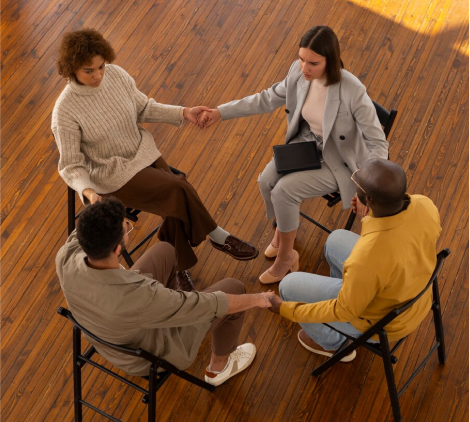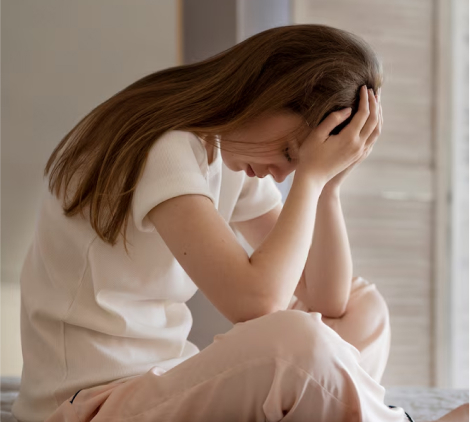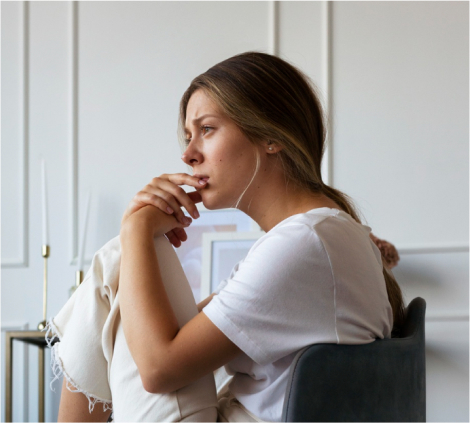Attention Deficit Hyperactivity Disorder (ADHD) is a condition that commonly affects children. However, it is often present among adults as well. Hyperactivity, impulsive behavior, and trouble focusing are some of its symptoms. Although ADHD is well known, little is explored about the complex ways in which it affects other aspects of everyday life, especially sleep. We will present the relationship between ADHD and sleep. Many adults with ADHD struggle to fall asleep, stay asleep, or they encounter restless nights. This may have a major impact on their general well-being. It is helpful to know about practical ways to manage ADHD and sleep problems. It could help people with ADHD live better lives.
Skip To:
Understanding ADHD and Its Impact on Sleep
Attention Deficit Hyperactivity Disorder (ADHD) is a neurodevelopmental condition that affects both children and adults. It is the most common neurodevelopmental condition in childhood, and between 50% and 66% of cases persist into adulthood. Adults with ADHD might find it hard to focus on tasks, stay still, or they might act without thinking. The symptoms of ADHD and sleep issues might make day-to-day living difficult. They could affect work, relationships, and especially sleep. The restless mind and body are characteristics of someone with ADHD. This often makes it challenging for them to relax and prepare for sleep. This leads to difficulties in falling asleep or experiencing restful nights. There are three main symptoms:
- inattention,
- hyperactivity,
- impulsivity.
ADHD has a major effect on adults’ sleep habits. This results in a variety of sleep issues. Many people who have the illness have trouble falling asleep, or they wake up throughout the night. There are cases when people struggle with both. Some may also suffer from sleep apnea or restless legs syndrome. These further reduce the quality of their sleep. Furthermore, it may be challenging to maintain a regular sleep pattern due to the disruption of the body’s internal clock caused by the unstable dopamine levels linked to ADHD. This combination of factors means that adults with ADHD often struggle to get the sleep needed for optimal health and functioning.

What is the difference between ADD and ADHD?
When it comes to ADD vs ADHD, the term attention-deficit disorder, or ADD, is no longer used to refer to the condition that we now refer to as attention-deficit hyperactivity disorder – or ADHD. Prior to 1987, when the term “hyperactivity” was introduced, it was known as ADD. A person would have been diagnosed with ADD, with or without hyperactivity, prior to then, say in 1980. However, that person would be diagnosed with ADHD beginning with the early 1990s. Between the early 1990s and the present, three different types of diagnoses were made.
The term “inattentive type” refers to people who solely showed inattentive symptoms. Only hyperactive and impulsive people belonged to the hyperactive/impulsive category. People with all three symptoms were referred to as mixed types. Due to habit or just because it’s a more well-known name than ADHD, many people still refer to ADHD as ADD. When someone has ADHD that is not hyperactive, they are referring to inattentive type ADHD. The most recent approach to understanding ADHD is to just focus on the symptoms that are most noticeable rather than classifying the condition into different categories.

ADHD Diagnosis
People get ADHD diagnosis through a comprehensive evaluation. Unfortunately, there is no such thing as a simple test that can confirm the presence of ADHD. Instead, the process consists of gathering information from various sources. A thorough assessment is necessary to make an accurate diagnosis. The assessments should be performed by a qualified healthcare provider. This might include a psychologist, psychiatrist, or pediatrician. Here’s a general overview:
- Clinical Interviews: Detailed discussions with the individual and, for children, their parents or guardians. Talks about the symptoms, their duration, and the impact on daily life.
- Rating Scales and Checklists: Both the individual suspected of having ADHD and those close to them, like family members or teachers, may be asked to complete some standard questionnaires. These tools assess the frequency and severity of symptoms.
- Medical Examination: A physical exam and sometimes specific medical tests are conducted to rule out other conditions that might cause similar symptoms. This might include hearing and vision tests to exclude sensory issues.
- Review of School or Work Records: For children and adolescents, school performance and behavior reports are crucial. For adults, work history and performance evaluations can provide insights.
- Observation: Behavioral observations by professionals can help identify how ADHD symptoms manifest in different settings.
- Psychological Testing: Tests for cognitive ability, executive functioning, and screening for co-occurring conditions such as learning disabilities or mood disorders.
Get Help. Get Better. Get Your Life Back.
Searching for Accredited Dual Diagnosis Mental Health Centers Near You?
Even if therapy failed previously, or are in the middle of a difficult crisis, we stand ready to support you. Our trusted behavioral health specialists will not give up on you. When you feel ready or just want someone to speak to about counseling alternatives to change your life call us. Even if we cannot assist you, we will lead you to wherever you can get support. There is no obligation. Call our hotline today.
FREE 24/7 Dual Diagnosis Mental Health Services HotlineADHD Sleep Issues: 4 Major Sleep Challenges in Adults with ADHD
Adults diagnosed with ADHD frequently have severe sleep disturbances that affect their ability to get a good night’s sleep and do their daily tasks. Sleep deprivation adds to ADHD symptoms. This can further deteriorate sleep quality due to a link between sleep and ADHD symptoms. These are the four main sleep anxiety symptoms that people often encounter:
- Difficulty Falling Asleep: Adults with ADHD often struggle to quiet their minds at night. They usually find themselves trapped in a loop of thoughts. This prevents them from achieving the calm state necessary for sleep.
- Restless Sleep: A person with ADHD may experience restless sleep even after they’ve fallen asleep. They often wake up multiple times throughout the night. This prevents deep, restorative sleep.
- Difficulty Waking Up: Mornings can be particularly tough. Many people experience extreme grogginess. This isn’t just the typical morning sleepiness. It’s a real struggle to leave the bed and start the day.
- Intrusive Sleep: During the day, people may face sudden waves of sleepiness. This makes it hard for them to stay alert and focused. The daytime sleepiness usually comes without warning. It affects work, studies, and daily activities.

Is ADHD a Sleep Disorder?
There’s a big discussion about whether ADHD should be seen as a sleep disorder. This is because people with ADHD often have trouble sleeping. Improving sleep can sometimes make ADHD symptoms better. This makes some people think ADHD and sleep are closely connected. Up to four out of five people with ADHD and nearly three out of every four children and adolescents with ADHD also suffer from a sleep disorder.
People with ADHD usually have sleep issues like delayed sleep phase syndrome and sleep-disordered breathing. Delayed sleep phase syndrome means that they have trouble sleeping and waking up at the usual times. Similarly, sleep-disordered breathing includes things like sleep apnea. It can make ADHD symptoms worse. These sleep problems show how close a link between sleep and ADHD is. All this underscores the need for comprehensive treatment approaches that address both aspects to improve patient outcomes.

End the Emotional Pain. Get Your Life Back.
Feeling Depressed, Anxious or Struggling with Mental Health Illness? Get Safe Comfortable Mental Health Dual Diagnosis High-Quality Therapy From Counselors That Care. Begin Your Recovery Now.
Hotline (855) 940-6125How to Manage Sleep Problems in ADHD?
Improving sleep hygiene can greatly benefit those with ADHD who are facing sleep problems. One key strategy is sticking to a consistent sleep schedule. It helps regulate the internal clock of the body and improve overall sleep quality. Creating a restful environment is also crucial. This means that you should make the bedroom comfortable for sleep, quiet, and dark. In order to prepare your body for a restful night, you should limit screen time before bed and avoid caffeine in the afternoon. Despite how easy they may appear, these steps can have a big impact on how easy it is to fall asleep. Additionally, meditation for ADHD helps by promoting relaxation, reducing stress, and improving concentration.

In addition to good sleep hygiene, ADHD medication and supplements might play a role in managing sleep issues for those with ADHD. For some people, prescribed sleep aids can help. However, you should always use them under a doctor’s guidance. They have many potential side effects and can cause dependency. Melatonin is a supplement that helps regulate sleep-wake cycles. It can be particularly helpful for people with delayed sleep phase syndrome. It’s a more natural option. People use it to establish a healthier sleep pattern. Nonetheless, like any treatment, its effectiveness can vary from person to person.
First-class Facilities & Amenities
World-class High-Quality Mental Health Services & Behavioral Health Substance Abuse Treatment
Rehab Centers TourRenowned Mental Health Centers. Serene Private Facilities. Inpatient Rehab Programs Vary.
Mental Health Helpline (855) 940-6125Proven recovery success experience, backed by a Team w/ History of:
15+
Years of Unified Experience
100s
5-Star Reviews Across Our Centers
10K
Recovery Successes
- Comprehensive Dual-Diagnosis Treatment
- Complimentary Family & Alumni Programs
- Coaching, Recovery & Development Events
- Comfortable Onsite Medical Detox Center
Professional Help for ADHD and Sleep Problems
Professionals familiar with the link between ADHD and sleep apnea can be a great deal of help for people experiencing difficulties in these areas. Experts in this field can give you insights and tailored strategies to manage the challenges of ADHD. They possess specialized knowledge to make treatment plans that address both the symptoms of ADHD and sleep problems that often go with it. Additionally, you should check out the ADHD treatment center in Florida as it can be the most important step when struggling with ADHD and its impact on sleep. These centers specialize in comprehensive care that encompasses both the behavioral aspects of ADHD and the physiological challenges related to sleep.

If you are in need of such specialized care, We Level UP Tamarac FL offers a supportive environment equipped to address the complexities of ADHD and sleep. Their dedicated team of professionals understands the nature of ADHD and uses tailored approaches to help you find relief and progress toward recovery from ADHD and sleep problems.
World-class, Accredited, 5-Star Reviewed, Effective Mental Health Dual Diagnosis Programs. Complete Integrated Inpatient Rehab with Free Post Discharge Therapy Planning.
CALL (855) 940-6125End the Emotional Pain Rollercoaster. Gain Stability & Happiness Through Recovery Treatment. Start Mental Health Counseling Today. Get Free No-obligation Guidance by Behaviroal Health Specialists Who Understand Mental Health Recovery.
Address ADHD Sleep Issues on Time and Improve Your Life
If you want to manage ADHD effectively, you need to understand that there is a link between sleep and ADHD. Addressing sleep issues is an essential part of comprehensive ADHD care. It can lead to significant improvements in daily life and overall health. Taking a holistic approach to treatment, which includes treating both ADHD symptoms and sleep disturbances, is the best path toward improved well-being. We Level UP Florida is a great resource if you are seeking to address these challenges. Their approach ensures that you receive the support and care needed to navigate the complexities of ADHD and sleep problems. By focusing on both, you can achieve a better quality of life and more fulfilling daily experiences.
Experience Transformative Recovery at the We Level Up Treatment Center.
See our authentic success stories. Get inspired. Get the help you deserve.



Start a New Life
Begin with a free call to a behavioral health treatment advisor. Learn more about our dual-diagnosis programs. The We Level Up treatment center network delivers recovery programs that vary by each treatment facility. Call to learn more.
- Personalized Care
- Caring Accountable Staff
- World-class Amenities
- Licensed & Accredited
- Renowned w/ 5-Star Reviews
We’ll Call You
Search We Level Up Tamarac FL for Link Between ADHD and Sleep Problems Topics & Resources
Sources:
American Thoracic Society PATIENT EDUCATION | INFORMATION SERIES www.thoracic.org CLIP AND COPY. (n.d.). Available at: https://www.thoracic.org/patients/patient-resources/resources/delayed-sleep-phase-syndrome.pdf.
Anderson, D. (2023). What is the difference between ADD and ADHD? [online] Child Mind Institute. Available at: https://childmind.org/article/what-is-the-difference-between-add-and-adhd/.
Shen, C., Luo, Q., Chamberlain, S.R., Morgan, S., Romero-Garcia, R., Du, J., Zhao, X., Touchette, É., Montplaisir, J., Vitaro, F., Boivin, M., Tremblay, R.E., Zhao, X.-M., Robaey, P., Feng, J. and Sahakian, B.J. (2020). What Is the Link Between Attention-Deficit/Hyperactivity Disorder and Sleep Disturbance? A Multimodal Examination of Longitudinal Relationships and Brain Structure Using Large-Scale Population-Based Cohorts. Biological Psychiatry, 88(6), pp.459–469. Available at: https://doi.org/10.1016/j.biopsych.2020.03.010.





